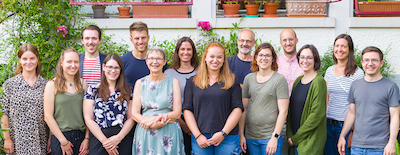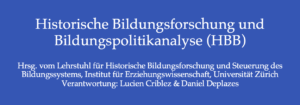PhD project | Anja Giudici | anja.giudici@ife.uzh.ch
School language policy matters. Decisions about the languages that are included in or excluded from school curricula have a major and differential impact on pupils’ school performance, their prospects in life, and in turn on the economic and human development of the societies in which they live. Consequently, when authorities determine which language(s) pupils will systematically acquire via formal education, these decisions have strong normative implications. No society is virtually monolingual; the policies surrounding languages in schools have redistributive effects and affect the access of linguistic groups to economic and political spheres. Moreover, levels of social inequality, fundamental and cultural rights, and the possibility of public discourse and democratic deliberation are affected.
The school language policies of the nineteenth and twentieth centuries are normally reduced to nationalism. Language curricula are said to be the state’s means of creating the monolingual nationals required to prove its legitimacy. However, the literature advances different causal mechanisms for explaining how nationalism affects curricula. These explanations may rely on actors’ interests, on actors’ ideas, or on the influence of social, economic, or power structures on the political process. So far, different theories have always been considered in isolation, and studies seldom discuss whether the theory they advance retains its explanatory power when alternative explanations are also considered.
This project aims to fill this gap. It involves comparing the different theories developed to explain school language policies and testing the causal mechanisms that they propose on an ideal ‘pathway’ case: the officially multilingual and federalist Switzerland. The project therefore asks the following question: What are the underlying reasons for why languages were included in or excluded from the curricula of Swiss public schools from the 1830s to the 1980s?
The project makes three key contributions. From a theoretical perspective, it promises to refine our theoretical understanding of school language policies’ underlying causes and mechanisms, and of the relationship among state-building, nation-building, and education policy more generally. Methodologically, by drawing on the recent advances made in historically informed qualitative case studies and, namely, process tracing, the project develops an original tool for a more theoretically informed and multidisciplinary approach to school language policies and curricula. Empirically, the project takes advantage of the analytical leverage offered by the case of modern multilingual and federalist Switzerland (1830/48–1980). Switzerland represents an ideal case for applying this conceptual framework and confronting different theories regarding school language policy with empirical data to test their mechanisms, specify the scope of conditions under which they can be suitable explanations for school language policies, and refine our general theoretical understanding of the phenomenon. Thereby, the project develops the first systematic historical reconstruction of the modern Swiss state’s school language policies. Given the increasing public attention to this topic in Switzerland, this knowledge is particularly valuable for informing political and public debate. Internationally, the solutions identified by Swiss policymakers are particularly relevant, as Switzerland is often cited as the paradigmatic case for successful and peaceful management of linguistic diversity.
Ergebnisse
Giudici, A. & Grizelj, S. (2017). National unity in cultural diversity: How national and linguistic identities affected Swiss language curricula (1914–1961). Paedagogica Historica: International Journal of the History of Education Society, 57(2), 137–154. http://dx.doi.org/10.1080/00309230.2016.1229348.
Giudici, A. (2017). Una centralizzazione passata dalla porta di servizio? Il federalismo scolastico svizzero: origini, evoluzione e sfide contemporanee. In Mueller, S. & Giudici, A. (eds), Federalismo svizzero: attori, strutture, processi (p. 193-222). Locarno: Dadò.
Giudici, A. & Manz, L. (2017, in press). Das Programm zur Nationalen Erziehung (1914–1924) oder wie in forcierter Kulturtransfer politisch scheitert. Schweizerische Zeitschrift für Bildungswissenschaften, 39(2).
Giudici, A. (2016). Una scuola per la democrazia? Relazioni fra politica linguistica scolastica, Stato e identità nazionale multilingue nel caso svizzero (1848–1938). Annali della storia dell’educazione, 23: 106–123.
Giudici, A. & Stojanović, N. (2016). Die Zusammensetzung des schweizerischen Bundesrates nach Partei, Sprache, Religion und Region, 1848–2015. Swiss Political Science Review, 22(2): 288–307.
Giudici, A. (2016). Der HSU in verschiedenen Einwanderungsländern und seine Vernetzung mit dem Schulsystem des Landes: Übersicht, Fakten, Modelle. In Schader, B. (ed.), Materialien für den Herkunftssprachlichen Unterricht: Grundlagen und Hintergründe (p. 148–153). Zürich: Orell Füssli.
Giudici, A. (2016). Bildungspolitik als Sprachenpolitik. In Criblez, L. & Binder, H.-M. (eds), Bildungspolitik als Beruf (p. 28–39). Zürich: Bildungsplanung.
Giudici, A. & Grizelj, S. (2014). Vom Berufs- und Elitewissen zum Garant des nationalen Zusammenhalts—Die Fremdsprachen in den Lehrplänen der Schweizer Volksschulen seit 1830. Babylonia. The Swiss Journal of Language Teaching and Learning, 21(3): 58–62. Online: http://babylonia.ch/en/archive/2014/number-3/ricerca-i/.

 Weitere Informationen zum Lehrstuhl HBS, zu Prof. Dr. Lucien Criblez und seinem Team sind auf der
Weitere Informationen zum Lehrstuhl HBS, zu Prof. Dr. Lucien Criblez und seinem Team sind auf der 
